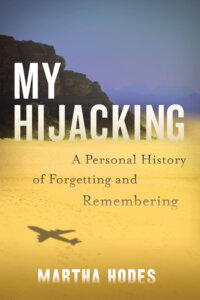A week as a hostage on a hijacked plane, a lifetime of anxiety and traumatic memories
In ‘My Hijacking,’ Martha Hodes tries to reconstruct ‘the most spectacular episode of air piracy the world had yet seen’

Photo of a Swissair plane that was hijacked in 1970 by the Popular Front for the Liberation of Palestine. Photo by Getty Images
My Hijacking: A Personal History of Forgetting and Remembering
By Martha Hodes
Harper, 384 pages, $32
In September 1970, when she was 12, Martha Hodes’ life intersected, terrifyingly, with history. Without their parents, she and her 13-year-old sister, Catherine, were held hostage for six days and nights on a hijacked plane in the Jordanian desert.
In the wake of their parents’ divorce, the two girls had been spending enchanted summers in Tel Aviv with their mother and their Israeli stepfather, both, like their father, gifted dancers. Martha Graham was a mentor and family friend.
Hodes’ TWA jet, a Boeing 707 en route from Frankfurt to New York, was one of four planes successfully hijacked by a group called the Popular Front for the Liberation of Palestine. A fifth hijacking attempt was foiled. The events constituted, Hodes writes, “the most spectacular episode of air piracy the world had yet seen” — and one for whose aftereffects she later received no counseling or other psychological help.
Hodes, now a professor of 19th-century history at New York University, mostly suppressed her memories of that traumatic period. But the trauma lingered. The terror attacks of 9/11, more than three decades later, reignited her anxiety, making her (more) afraid to fly.
Memories of the childhood incident “began to intrude,” she writes. And Hodes eventually set out to determine, in meticulous detail, what exactly happened on that hijacked airliner — and why she remembered so little of it. The result is My Hijacking, an often taxing combination of memoir and history that probes — and circles insistently around — that week and its aftermath.
Hodes uses primary sources, including her own scattershot diary (comprising “not a full record but instead a tolerable story”); contemporary newspaper accounts and television footage, and interviews with other former hostages — as well as friends and family members — to reconstruct her experience.
She tries to capture the emotions of her worried parents, as well as the larger political context of the mass hijacking. “With a scholar’s passion for evidence and accuracy,” she writes, “I wanted to compare recollections, compare documents, and compare recollections and documents with each other.”

She interrupts the narrative periodically with quotations from Antoine de Saint-Exupéry’s The Little Prince, whose setting is a desert plane crash — literary affectation that, like much else in this narrative, quickly grows tiring.
The most gripping section of My Hijacking is Hodes’ immersive account of life on the hijacked plane. Those passages vividly convey the challenges the passengers, the crew and their kidnappers faced, from the paucity of food to the stench of the toilets. Imagine the discomforts and claustrophobia of a normal transatlantic flight, multiplied by a week, and compounded by uncertainty and fear.
Despite moments of kindness and camaraderie, the hostages lived in a miasma of terror that waxed and waned. Their fate was out of their hands. It was always possible that if negotiations with the outside world failed, the hijackers, who had wired the plane with explosives, would blow it up with the passengers still onboard. Or that they would single out individual captives for retribution. That threat seemed starkest for those passengers, including the Hodes girls, who were Jewish.
The memories that Hodes carried with her into adulthood, though, were mostly happier ones. She recalled moments of levity, including sing-alongs and a game of jump rope. At one point, the hostages cleverly rewrote John Denver’s lyrics for “Leaving on a Jet Plane,” singing instead, “I’m living on a jet plane.”
The book’s main problem is Hodes’ bobbing-and-weaving narrative structure. Intended no doubt to reflect her exploration of the subject, it guarantees the tedious repetition of small details far more meaningful to her than to the reader.
Over and over again, Hodes asks why she suppressed her fear. She notes, also repeatedly, that many fellow passengers failed to remember her presence, or her sister’s, on the plane. She recalls the early assurance by a kind copilot that the hostage-takers intended them “no bodily harm.” She observes the inadequacy of her own written record.
What does all this amount to? Hodes expresses empathy for the hostage takers, and for their sufferings as Palestinians exiled from a land they saw as theirs. And she concludes that the suppression of her memories was probably linked, in part, to her familial plight, as a child of divorce whose parents lived, for a time, on different continents.
My Hijacking is a prodigious research endeavor, sincerely undertaken. It serves as an admirably thorough personal exorcism. But its storytelling never really takes flight.























